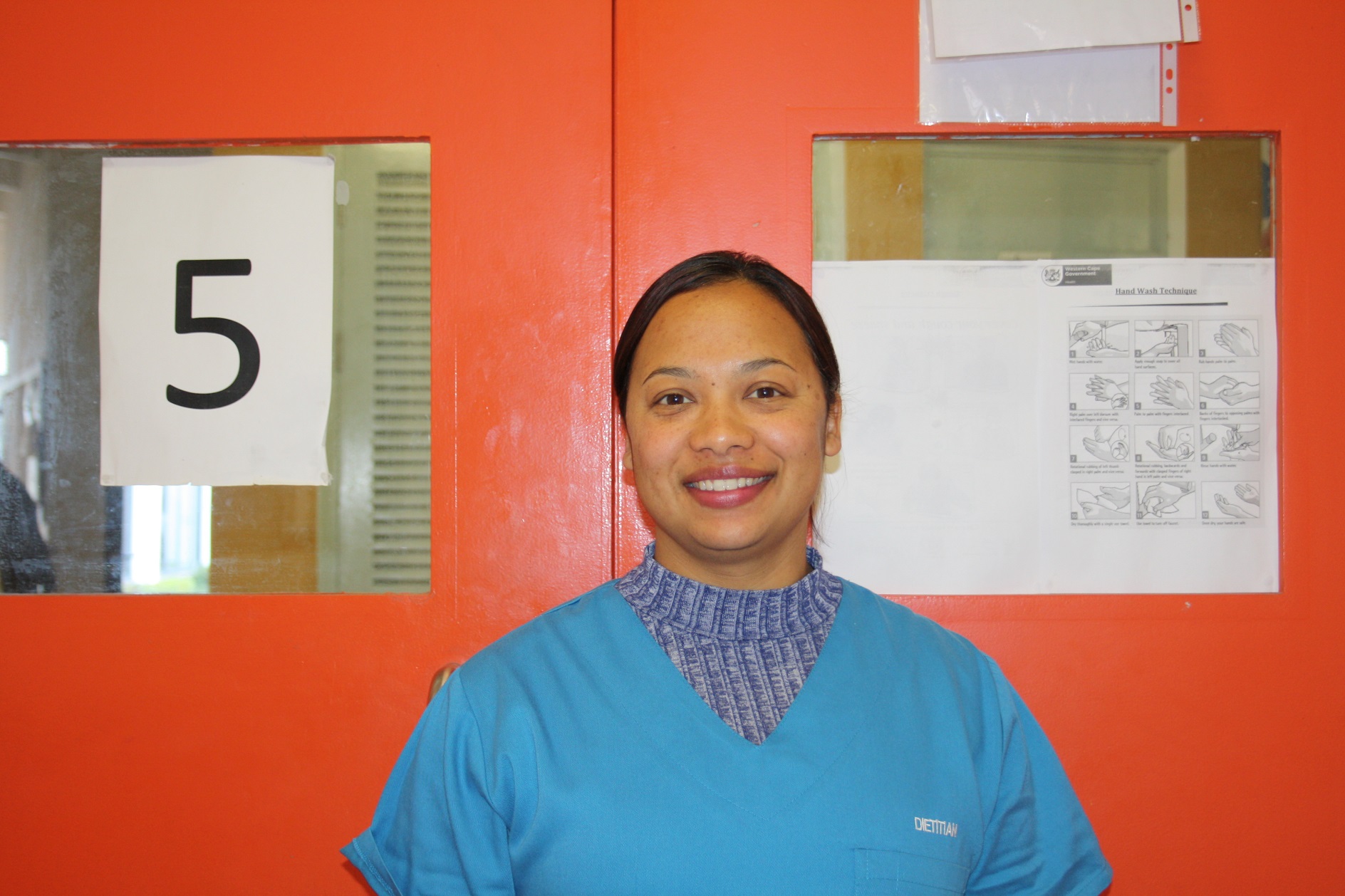
News
National Kidney Awareness Week – Don’t take your kidneys for granted
Faith van der Ross’s journey with kidney disease started when she was just one years old. Faith, who will celebrate her sixth birthday later this month, regularly visits the Symphony Way CDC in Delft for healthcare.
As we mark National Kidney Awareness Week this September, Faith’s family has shared their story and has urged members of the public to take care of their kidney health.
Faith’s aunt, Gleneez Domingo, says Faith has visited the local clinic since the age of one with her mother to access support from a dietician. Faith’s mom, who has passed on, was diagnosed with kidney disease when she was a child too and later had a kidney transplant. Her kidney was donated by her sister, Gleneez.
Today, Gleneez continues to take Faith for regular check-ups to ensure that she lives a healthy lifestyle. With the support from her grandmother, aunt and healthcare workers like dietician Joy Williams, Faith proves that it is possible to live a healthy lifestyle with kidney disease.
“Joy has always been a literal joy to go to with Faith. She’s very attentive and always ensures that Faith has the right diet to protect her health. She will always call to ensure that Faith is doing well and that she is eating the right food. She’ll ask, ‘Is Faith eating her porridge and other meals?’ Since receiving help from Joy and the Symphony Way CDC team, Faith has gained weight and is doing much better. Joy has never given up on Faith and our family is so grateful for the support. Don’t be afraid to get help at your local clinic.”
Gleneez says we should not take our kidney health for granted, adding that education around kidney disease and healthy living is key.
“My sister had kidney disease when she was only two years old. Many people may not realise how important it is to take care of their kidneys whether you’re born with an issue or not. We hear about it but may not fully understand the value of our kidneys. When Joy gives advice, I listen. I am living with one kidney and I do my best to take care of my health. Never forget the importance of drinking water and eating well.”
HEALTHY LIVING MATTERS
Our kidneys play a very important role to help filter the blood and remove waste products, toxins and extra fluid in our body. Goodwood CDC Dr Venter Snyman shares that there are many causes of kidney disease that we can prevent, however, there are causes that can be inherited. This means you may be more likely to get kidney disease if you have a close relative with kidney disease. Chronic diseases can also play a role in your kidney health. This is why a healthy lifestyle is so important for all people.
“The importance is that we recognise these causes and then manage them. The most common causes in the public we see is poorly controlled blood pressure (hypertension) and poorly controlled sugar (diabetes) that can affect your kidney health. The good news is that we can protect our kidneys if we maintain good control over these two diseases. Other causes we also see would be severe urinary tract infections, blocked urinary tracts (prostate problems or renal stones) overuse of certain drugs, especially anti-inflammatory drugs like Ibuprofen and heart failure.”
There are many ways that we can take care of our kidney health. “We can protect our kidneys by drinking enough water (8 glasses a day or +- 1,5L a day), only using prescribed drugs or over the counter drugs as the insert or instructions guide us and visiting our local clinics for a general check up to screen for diseases like hypertension and diabetes,” says Dr Snyman.
Dietician Joy is passionate about making a difference in the lives of her patients. Joy helps a range of patients, including adults and children. Joy says kidney disease is normally a secondary complication that stems from other diseases such as hypertension, diabetes or heart disease.
Therefore, it is important for everyone to eat a well-balanced diet that contains complex starches (brown breads and rice), lean protein, fresh fruit and vegetables and to maintain a healthy weight along with the recommended 150 minutes exercise per week.
Whether you’re living with kidney disease or not, monitoring your salt intake and lifestyle is important, says Joy. The consumption of too much salt can increase blood pressure, which increases the risk for stroke, coronary heart disease, heart failure, and kidney disease
“The body needs salt to function as it helps regulate the body’s fluid balance and helps to maintain normal blood pressure. Unhealthy kidneys cannot excrete excess sodium and therefore it accumulates in the blood stream, which causes the body to retain too much water and can cause high blood pressure, strokes, and heart disease.”
For adults, the World Health organisation recommends that adults consume less than 5 g (just under a teaspoon) of salt per day (1).
For children: WHO recommends that the recommended maximum intake of salt for adults be adjusted downward for children aged two to 15 years based on their energy requirements relative to those of adults. Consult a healthcare worker for more advice.
Joy has shared the following tips to reduce salt in your daily diet:
1. Do not add salt to food during the cooking process except for when it is indicated by the dietician, and do not add extra salt to food at the table. Rather use alternative flavourings that do not contain salt, e.g. herbs, pepper, curry, vinegar, onions, peppers, garlic, ginger, rosemary and lemon juice.
2. Avoid salt-containing flavouring agents (spices containing salt or stock cubes).
3. Potassium products containing salt replacements should not be used as a replacement since too much potassium can be life threatening to a patient with kidney ailments. Consult your dietician for advice.
4. Check the food labels for forbidden ingredients e.g. salt, sodium, monosodium glutamate (MSG), or any sodium-containing additive.
5. Foods with a high salt content should be restricted. Restrict food like viennas, cold meats, ham, hamburger patties or bully beef, beef and pork sausages. Use unprocessed chicken, meat or fish, meatballs or other lean mince dishes – or fresh/frozen fish products.
6. Restrict salty snacks like chips, salty biscuits, biltong or dried sausage. Opt for Provitas or whole wheat crackers, unsalted nuts, seeds and popcorn.
At the same time, habits such as smoking tobacco products or drinking alcohol can affect your kidney health. Smoking can also increase your risk for other diseases such as cancer while regular or heavy consumption of alcohol can affect your kidney functioning. You can access guidance from support groups in your community or your local clinic.
SYMPTOMS AND ACCESSING CARE
Some kidney ailments may not cause symptoms early in the disease. Dr Snyman explains: “Some people may have a burning sensation or difficulty while passing urine with a bladder infection or prostate disease. Unfortunately, many of the symptoms of kidney disease only start when we have significant kidney injury already. These symptoms of advanced disease could be fatigue; uncontrolled blood pressures; swelling of your legs and shortness of breath. Visit your nearest clinic if you have any concerns.”
You can access a range of services at your local clinic to protect your health. Joy says a renal diet will be recommended by a registered dietitian to those patients who have some sort of kidney impairment and will change depending on the patient’s treatment plan. However, you can access a diet plan to help manage your chronic illnesses as well.
“Blood tests are normally done to ensure that the kidneys are functioning well, these include the following: minerals, sodium (Na), Potassium (K) and phosphate (PO4). These minerals are also found in foods and therefore it is important be cautious of the type and portion sizes of foods we eat when we have kidney impairment. Sodium, potassium, and phosphate containing foods are normally restricted in patients with kidney disease. You can access advice on a low phosphate diet at your clinic. Remember to visit your local clinic to access healthcare and to honour your appointment dates with your healthcare worker.”
Take charge of your kidney health today by eating well and exercising regularly. It is important to eat healthy in general to prevent chronic diseases which can lead to kidney disease. It is equally important to eat healthy and use medication as prescribed when the kidneys do not function properly to prevent other complications and further organ damage. Visit your local clinic for more support or advice from a dietician for a range of health conditions at no cost.







